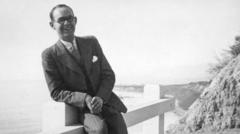Who Was the Welshman Who Met Hitler and Exposed Stalin?

Honoring Gareth Jones: The Legacy of a Pioneering Journalist
Gareth Jones, a name that resonates with courage and integrity, may have lived only to the age of 30, but his short life was packed with experiences that shaped not only his legacy but also the narrative of significant historical events. From flying with Adolf Hitler to exposing the horrors of man-made famine in Stalin's Soviet Union, Jones's story is both compelling and tragic. Today, as we commemorate the 90th anniversary of his death, there is a growing movement to honor his memory by naming a waterfront square in Barry, Vale of Glamorgan, his hometown. This article delves deep into the life and legacy of Gareth Jones, exploring his remarkable achievements, the challenges he faced, and the ongoing efforts to set the record straight about his contributions to journalism and history.
The Early Life of Gareth Jones
Born in 1905 in Barry, Wales, Gareth Jones was raised in an environment that fostered curiosity and intellectual rigor. He excelled academically, earning four first-class honors degrees in languages from Aberystwyth and Cambridge universities. This academic prowess set the stage for his entry into the world of journalism and public affairs. At just 24 years old, he became a foreign affairs adviser to former Prime Minister David Lloyd George, a position that would expose him to the highest echelons of power.
A Rising Star in Journalism
Jones's career really took off as he began to write for newspapers, most notably the Western Mail. His assignments took him across Europe and beyond, where he engaged with prominent figures such as Lenin's widow, Krupskaya, and US President Herbert Hoover. His fearless approach and keen insights quickly established him as one of the foremost journalists of his time.
Witness to History: The Hitler Years
In 1932, Jones was sent to Germany to cover the rise of Adolf Hitler. What began as a journalistic assignment turned into an extraordinary opportunity that few could have anticipated. He gained unprecedented access to Hitler and the Nazi party, attending their rallies and even flying on Hitler’s private plane. While he reported on the economic improvements in Germany during Hitler's early years, he also recognized the underlying antisemitism that was central to Nazi ideology.
Complexity of Reporting
Jones's reporting was nuanced; he called out the Nazis for their antisemitic views while also acknowledging the economic recovery that was taking place. This balance of criticism and acknowledgment was rare among journalists of his time, and it showcased his commitment to delivering an honest portrayal of events, regardless of public sentiment.
Unveiling the Horrors of the Soviet Union
Perhaps Jones's most significant contribution to journalism came during his reporting on the Holodomor, the man-made famine in the Soviet Union that resulted in the deaths of millions. His accounts, however, were met with skepticism and disbelief, particularly from major Western media outlets like the New York Times. Jones's reports were dismissed as sensationalized, leading him to confront critics who downplayed the severity of the crisis.
Understanding the Holodomor
According to Philip Colley, Jones's great-nephew, much of the contemporary narrative surrounding Jones has been distorted. While some portray him as a Ukrainian hero exposing a deliberate genocide, Colley argues that Jones's focus was broader. He was concerned not only about the famine in Ukraine but also about the widespread suffering caused by Stalin's policies across the entire Soviet Union.
The Circumstances of His Death
In 1935, Jones turned his attention to the Japanese occupation of Manchuria. After being turned away by Japanese authorities, he was captured by Chinese bandits and, after two weeks of captivity, was shot dead under mysterious circumstances. Various theories about his death have emerged, ranging from a botched kidnapping to an assassination ordered by the Soviet secret service or even the Japanese government. His untimely death left many questions unanswered and added an air of tragedy to his already remarkable life.
Legacy and Misrepresentation
In the years following his death, Gareth Jones's legacy has been the subject of much debate. While his contributions to journalism are widely recognized, how he is remembered varies significantly. Campaigners are now working to establish a waterfront square in his honor in Barry, emphasizing the importance of preserving his story and contributions to history.
The Role of Philip Colley in Preserving His Great-Uncle's Legacy
Philip Colley is determined to set the record straight about Gareth Jones. He believes that much of the historical narrative surrounding his great-uncle has been refashioned to fit modern political agendas. Colley's work aims to shed light on the true nature of Jones's journalism and the broader context in which he operated. His biography seeks to highlight not only Jones's accomplishments but also the challenges he faced in a world that often preferred comforting narratives over uncomfortable truths.
A Call to Action
The movement to honor Jones reflects a growing acknowledgment of the importance of accurate historical representation. As we strive to remember figures like Gareth Jones, we must also recognize the need for critical engagement with history. This involves understanding the complexities of their lives and the contexts in which they operated. In a world where misinformation can spread rapidly, the need for integrity in journalism and historical documentation is more crucial than ever.
FAQs About Gareth Jones
Who was Gareth Jones?
Gareth Jones was a Welsh journalist known for his reporting on significant historical events, including the rise of Hitler and the man-made famine in the Soviet Union known as the Holodomor.
What did Gareth Jones report about the Holodomor?
Jones reported on the widespread famine in the Soviet Union in the early 1930s, highlighting the suffering caused by Stalin's policies. His accounts were initially dismissed by many in the Western media.
How did Gareth Jones die?
Gareth Jones was shot dead under mysterious circumstances after being captured by Chinese bandits in Manchuria in 1935.
Why is Gareth Jones's legacy important today?
His legacy is important because it underscores the role of journalism in exposing truths that challenge prevailing narratives. It also serves as a reminder of the responsibility journalists have in accurately portraying events, especially in times of crisis.
What efforts are being made to honor Gareth Jones?
Campaigns are underway to name a waterfront square in Barry, Wales, in honor of Gareth Jones, recognizing his contributions to journalism and the importance of preserving his story.
As we reflect on the life of Gareth Jones, let us consider how we can learn from his commitment to truth and integrity in journalism. In an age where misinformation is rampant, the importance of accurate reporting and historical accountability is more critical than ever. How can we ensure that the legacies of individuals like Gareth Jones are preserved and understood in their rightful context? #GarethJones #Journalism #Truth
Published: 2025-08-03 15:30:27 | Category: wales



